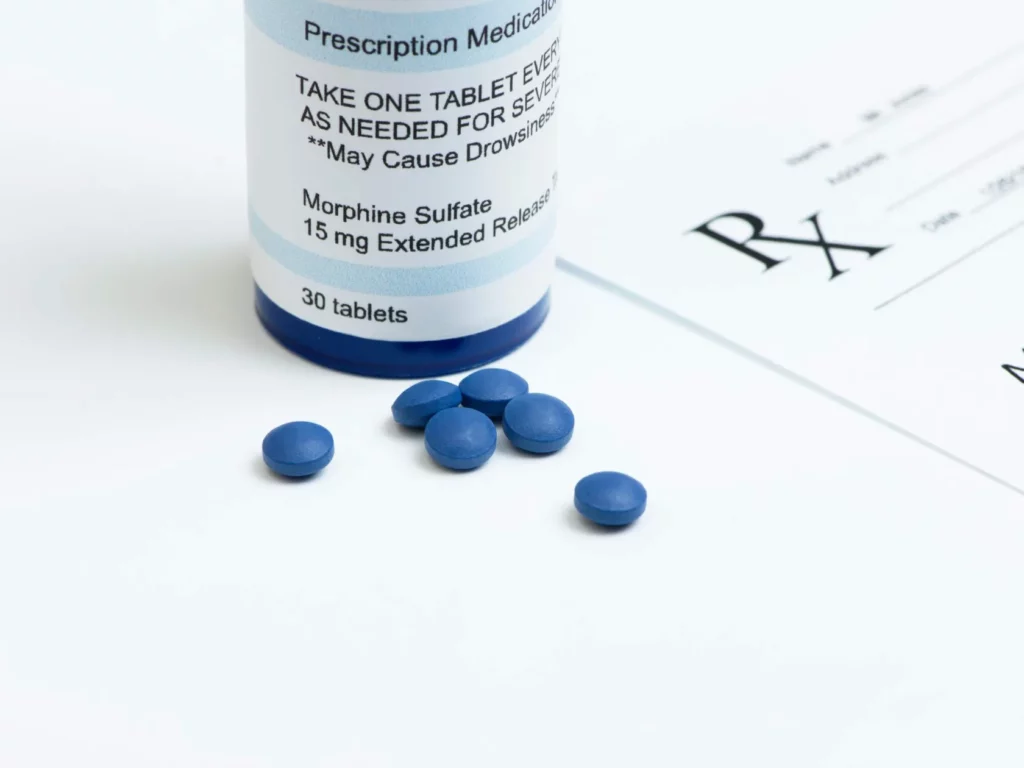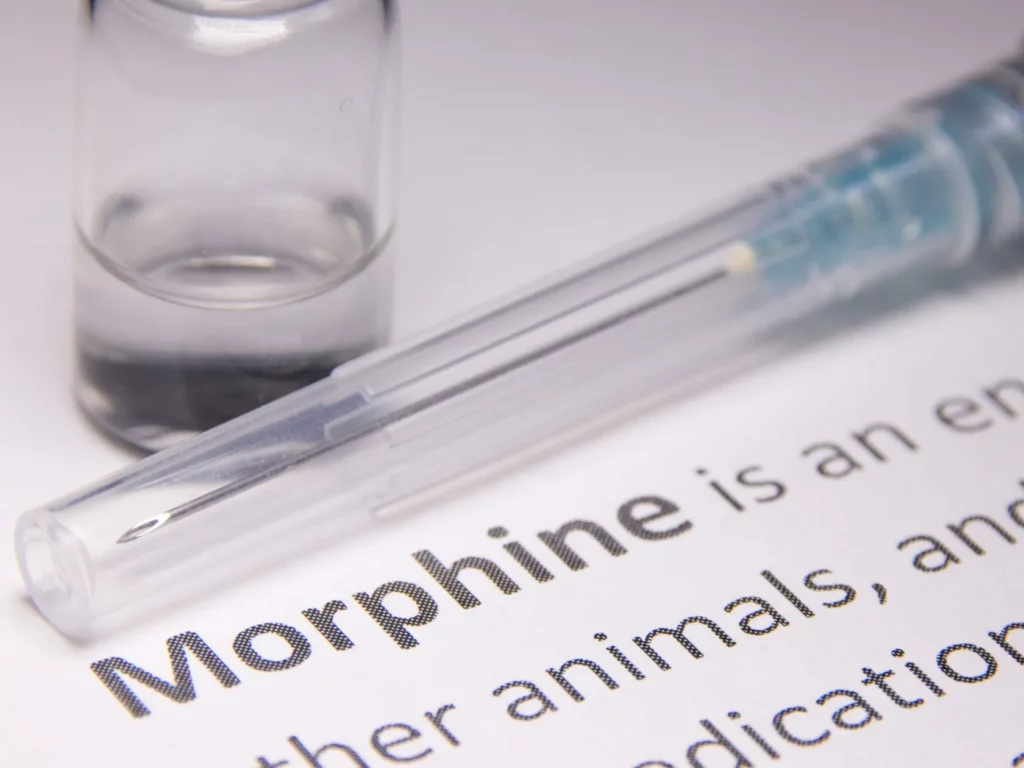Start Your Morphine Detox Today
Taking the first step toward recovery from morphine addiction can feel overwhelming, but our compassionate team at Pacific Interventions is here to guide you. Begin your journey to a healthier, drug-free life today with dedicated support every step of the way.

Morphine Detox Timeline
The morphine detox process typically lasts from several days to a few weeks, with withdrawal symptoms appearing within hours of stopping or significantly reducing use. Symptoms usually peak during the first few days and gradually subside within two weeks. While most physical symptoms fade after this period, some mental effects can persist, making each person’s experience unique.

Risks Of Morphine Withdrawal
Morphine detox can pose risks to both physical and mental health. Strong cravings during withdrawal may increase the risk of relapse. Physical symptoms, such as dehydration, electrolyte imbalances, and heart issues, are especially concerning for those with pre-existing health conditions.
Withdrawal also carries mental health risks, including heightened anxiety, depression, and even suicidal thoughts, which can make recovery more challenging. Professional support is crucial during detox to manage these risks and ensure a safer, more supportive healing process.

Take the First Step Towards Recovery
Is Morphine Detox Necessary?
Morphine detox is crucial for safely managing withdrawal symptoms and achieving lasting recovery. At Pacific Interventions, we understand the mental and physical challenges of quitting alone, as well as the high risk of relapse.
Our detox program provides a safe, supportive environment where medical staff closely monitor symptoms, administer appropriate medications, and offer emotional support. This process not only clears morphine from the body but also equips individuals with healthier coping mechanisms for long-term recovery.
Effects of Morphine on the Brain
Morphine primarily impacts the brain’s reward system by binding to opioid receptors, triggering dopamine release, which creates euphoria and relieves pain. Over time, this alters brain chemistry, increasing tolerance and dependence.
Long-term use can impair brain functions, affecting decision-making, memory, and emotional regulation. As the brain adapts to morphine, withdrawal symptoms emerge when users try to quit, underscoring the need for a structured detox process to support safe recovery.
Symptoms of Morphine Withdrawal
When you stop using morphine, your body may respond with various uncomfortable sensations, known as withdrawal symptoms. Common effects include:
- Hot and Cold Flashes: Excessive sweating, chills, and “goosebumps.”
- Anxiety and Irritability: Heightened emotional sensitivity, leading to agitation and restlessness.
- Cravings: Strong urges to use morphine again, often hard to resist.
- Gastrointestinal Disturbances: Nausea, vomiting, diarrhea, and loss of appetite.
- Tremors: Shaking or trembling in different parts of the body.
- Watery Eyes and Runny Nose: Increased secretions similar to cold or flu symptoms.
- Yawning: Frequent yawning and general fatigue.
- Sleep Disturbances: Insomnia or difficulty staying asleep.
Given the intensity of these symptoms, approaching morphine withdrawal with a structured plan and medical support is crucial for a safer and more manageable detox process.
Signs You Need Morphine Detox
Recognizing the signs that you may need morphine detox is essential for starting your recovery journey. Key indicators include:
Increased Tolerance
Needing higher doses for the same effect can indicate growing dependence.
Physical Dependence
Withdrawal symptoms, such as nausea, sweating, or anxiety, upon reducing use are clear signs detox is necessary.
Frequent Cravings
Strong urges to use morphine that disrupt daily life signal a need for professional support.
Interference with Daily Life
Morphine use impacting relationships, work, or personal responsibilities means it’s time to seek help.
Negative Physical Health Effects
Persistent fatigue, digestive issues, or unexplained pain may indicate the need for detox.
Mental Health Changes
Increased anxiety, depression, or mood swings linked to morphine use suggest professional intervention is required.
Isolation
Withdrawal from social activities or avoiding friends and family to use morphine privately.
Failed Attempts to Quit
Repeated, unsuccessful efforts to reduce or stop morphine use often indicate a need for structured detox.
Side Effects of Morphine Detox
During morphine detox, the body may experience various side effects as it adjusts to functioning without the drug. The intensity and duration of these effects depend on the level of dependence and the length of use.
Physical Side Effects
Common physical side effects include nausea, dizziness, shaking, and excessive sweating. Fatigue is also typical during detox, often worsened by disrupted sleep patterns.
Mental Side Effects
Detox can trigger anxiety, irritability, and mood swings, making this period emotionally challenging. In some cases, intense cravings for morphine can complicate the recovery process, presenting a strong psychological hurdle.
Medical support is crucial during morphine detox, as professionals can monitor side effects and improve comfort. Pacific Interventions provides comprehensive care during this critical stage, ensuring a safer, more manageable detox process.
Take the First Step Towards Recovery
FAQ
Morphine detox is the process of safely stopping morphine use, allowing the body to eliminate the drug while managing withdrawal effects.
Detox typically lasts 5-14 days, with symptoms peaking in the initial days and gradually subsiding.
Common symptoms include hot and cold flashes, anxiety, cravings, nausea, tremors, and sleep issues.
Yes, professional help is recommended to manage symptoms safely and reduce the risk of complications.
Detoxing at home is not advised due to severe symptoms and a higher risk of relapse.
After detox, ongoing support like counseling, support groups, or addiction treatment programs is crucial for long-term recovery. Addiction rehab can also provide structured care to address underlying issues and prevent relapse.
What Our Patients Say About US
Posted onTrustindex verifies that the original source of the review is Google. This is a great rehab program and I definitely recommend them.Posted onTrustindex verifies that the original source of the review is Google. First rate service from start to finish. Thank you for your help!Posted onTrustindex verifies that the original source of the review is Google. I’m so grateful for this service. It helped me make the first steps to changing my life.Posted onTrustindex verifies that the original source of the review is Google. I strongly recommend this place for anybody struggling with alcohol and drug addictionPosted onTrustindex verifies that the original source of the review is Google. Pacific intervention provided a service unlike any other I have ever experienced. They really focused on me as an individual and I felt like they really cared. I had a team behind me and they gave me the tools I needed to move forward in my life.Posted onTrustindex verifies that the original source of the review is Google. I am writing this review on behalf of our entire family. When our son came to us and said he had a drug problem, we were horrified. We quickly started looking for services to help. We called a number of places with very limited satisfaction. No one was explaining to us what was going on with our son, they only seemed interested in taking our money. That was until we spoke to Jeff at Pacific Interventions. He took the time to explain addiction, current treatment approaches, recovery, and how we could help. Our son ended up attending the 6 week outpatient program with Pacific Interventions. He graduated the program and is currently taking part in their aftercare program. Our son is back to the person we thought we had lost. He has confidence, self-esteem and our relationships with him are all much improved. Our family participated in the family program which offered us real solutions to broken trust, conflicts, and ways to help build our son up and support his recovery. We are all extremely grateful for the help of the entire team at Pacific Interventions for following through on what they said they would do, and helping our family heal.
Need Help Right Away? We are Here to Support You!
If you have an emergency, contact your local hospital or dial 911 immediately

